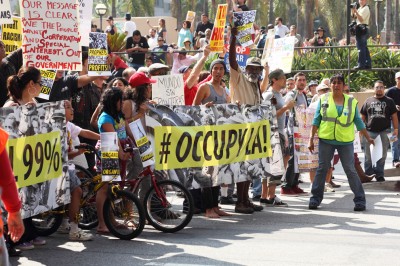
After the rock shows and marching was over, Occupy LA’s finance committee proposed organizing a 501 (c) (4) nonprofit organization in the name of Occupy LA at the group’s general assembly in front of city hall at 7:30 p.m. Saturday, the proposal was tabled to be discussed at the group’s next general assembly.
About 10,000 – 15,000 people participated in Saturday’s Global Day of Action, as stated in a preliminary police report, although most were not present for the assembly.
The IRS sees 501 (c) (4) organizations as social welfare groups which can accept large, non-tax exempt donations and are not exempt from lobbying or engaging in political activity, said 26-year-old Callie Little, who has fundraising experience.
A 501 (c) (3) nonprofit, like Occupy Wall Street has, was not proposed because of the limitation on how they can participate in lobbying and politics, in addition to allowing tax deducted donations, something the group feared would attract corporate donors, the committee said.
The finance committee said they did not want to risk being co-opted by anyone making too big a donation.
The scheduled 30 second proposal took over an hour as those present debated the benefits of evolving the protest in this way.
“We want to build the movement, but the reality is we need to be able to provide the services, maintain the group’s needs and not limit ourselves politically later on,” Little said. “A (c) (4) nonprofit would let us do that,” she said.
Although other organizations, such as Crooks and Liars, have taken donations in the name of Occupy LA, there is nothing set in place to handle the donations received on site directly, Little said.
This becomes a problem because it places all liability on the finance committee to be transparent and keep track of the financial matters and because services such as the on-site waste management must be paid by checks, she said.
“Doing this would allow us to put donations into an organizational credit union and allow donors to write checks to Occupy LA,” said Little.
Some questioned why becoming a legal entity was being proposed as the best solution or criticized it as hypocritical, some suggested forming a political party, others did not feel that $1,500 should be spent on the fees to file as a nonprofit; reactions varied.
“I’m not anti-corporate or anti-taxes, I just think it needs to be fair. Corporations should not be allowed loopholes not available to everyone. There are a lot of anti-establishment thoughts here and they are not willing to work within the system,” said protester Hanley Bonynge.
Amy Smith, a tax accountant in the private sector, has donated her time to assist the finance committee.
“There is no hope on the street. I want this movement to stand on its own feet and not be taken as a joke. This step can allow us to make change,” Smith said.





